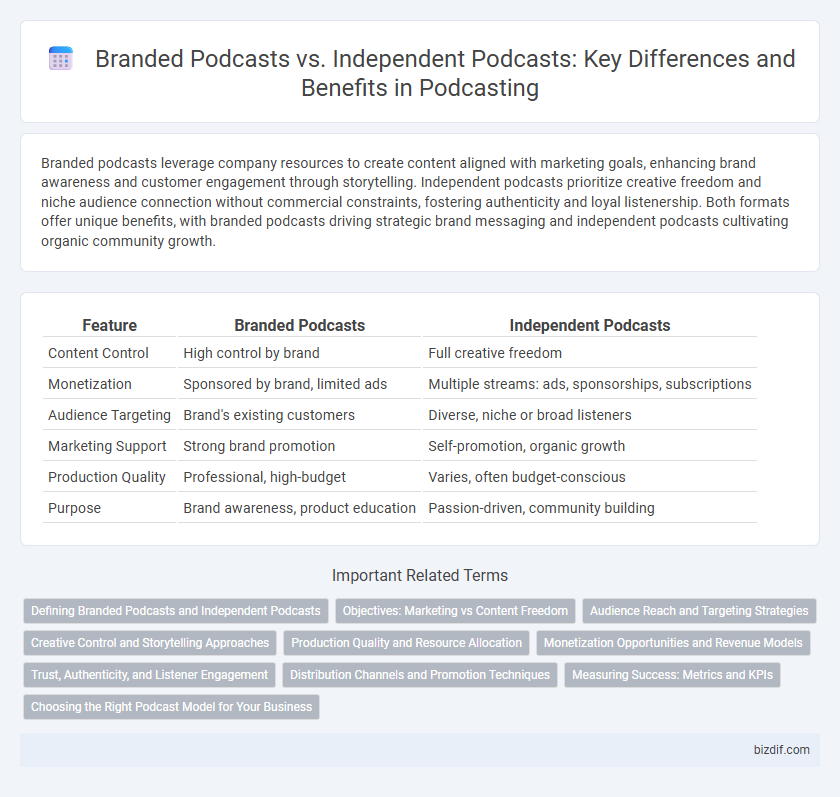Branded podcasts leverage company resources to create content aligned with marketing goals, enhancing brand awareness and customer engagement through storytelling. Independent podcasts prioritize creative freedom and niche audience connection without commercial constraints, fostering authenticity and loyal listenership. Both formats offer unique benefits, with branded podcasts driving strategic brand messaging and independent podcasts cultivating organic community growth.
Table of Comparison
| Feature | Branded Podcasts | Independent Podcasts |
|---|---|---|
| Content Control | High control by brand | Full creative freedom |
| Monetization | Sponsored by brand, limited ads | Multiple streams: ads, sponsorships, subscriptions |
| Audience Targeting | Brand's existing customers | Diverse, niche or broad listeners |
| Marketing Support | Strong brand promotion | Self-promotion, organic growth |
| Production Quality | Professional, high-budget | Varies, often budget-conscious |
| Purpose | Brand awareness, product education | Passion-driven, community building |
Defining Branded Podcasts and Independent Podcasts
Branded podcasts are audio series produced by companies to promote their products, services, or values while engaging their target audience through storytelling and expert insights. Independent podcasts operate without corporate sponsorship, allowing creators full editorial freedom to explore niche topics, build authentic community connections, and monetize through listener support or advertising. Understanding these distinctions is crucial for marketers and creators to align content strategy with brand goals and audience expectations.
Objectives: Marketing vs Content Freedom
Branded podcasts serve marketing objectives by promoting products, enhancing brand awareness, and engaging target audiences through tailored messaging. Independent podcasts prioritize content freedom, allowing creators to explore diverse topics, express authentic voices, and build loyal communities without external commercial constraints. Marketing-driven branded podcasts often follow strategic campaigns, while independent podcasts emphasize creative control and audience-driven growth.
Audience Reach and Targeting Strategies
Branded podcasts leverage company resources to target specific consumer segments, often benefiting from integrated marketing campaigns to expand audience reach effectively. Independent podcasts rely on organic growth, niche content, and community engagement to attract dedicated listeners, resulting in highly targeted but potentially smaller audiences. Audience targeting strategies for branded podcasts use data-driven insights for precision marketing, while independent creators utilize social media and word-of-mouth to foster loyal, engaged communities.
Creative Control and Storytelling Approaches
Branded podcasts often operate within specific marketing guidelines, limiting creative control but ensuring consistent alignment with a brand's message and values. Independent podcasts enjoy greater storytelling freedom, allowing hosts to experiment with formats, narratives, and topics without external constraints. This autonomy fosters diverse content and authentic audience connections, distinguishing independent shows from brand-driven productions.
Production Quality and Resource Allocation
Branded podcasts often benefit from higher production quality due to greater budget allocation and access to professional studios, sound engineers, and marketing teams, ensuring polished audio and consistent branding. Independent podcasts typically operate with limited resources, relying on affordable equipment and self-managed production, which can result in variable audio quality but fosters creative freedom and authenticity. Resource allocation in branded podcasts prioritizes scalability and audience engagement metrics, while independent creators focus on content originality and community building.
Monetization Opportunities and Revenue Models
Branded podcasts leverage company budgets to secure predictable revenue through sponsorships, product placements, and integrated advertising aligned with brand identity. Independent podcasts often rely on diverse monetization strategies including listener donations, crowdfunding via platforms such as Patreon, and dynamic ad inserts tailored to episodic content. Revenue models for branded podcasts emphasize long-term partnerships, while independent creators prioritize flexibility and audience-driven funding to sustain growth.
Trust, Authenticity, and Listener Engagement
Branded podcasts often leverage company reputation to build initial trust, yet independent podcasts excel in authenticity by fostering genuine, unfiltered conversations that deeply resonate with niche audiences. Listener engagement tends to be higher in independent podcasts due to personalized content and a stronger sense of community, while branded podcasts must carefully balance promotional messaging to avoid perceived bias. The trustworthiness and authenticity of a podcast largely influence long-term listener loyalty and overall engagement metrics in the competitive podcasting landscape.
Distribution Channels and Promotion Techniques
Branded podcasts leverage established company websites, social media platforms, and email marketing lists to maximize distribution reach, while independent podcasts primarily rely on popular podcast directories such as Apple Podcasts, Spotify, and Google Podcasts for accessibility. Promotion techniques for branded podcasts often include cross-promotion through paid ads, influencer collaborations, and integration with other brand campaigns, whereas independent podcasters utilize organic growth strategies like community engagement, guest appearances, and targeted social media outreach. Effective distribution and promotion significantly impact audience acquisition and retention depending on whether the podcast operates under a corporate brand or independent status.
Measuring Success: Metrics and KPIs
Branded podcasts primarily gauge success through metrics like brand engagement, conversion rates, and audience sentiment to align with marketing goals. Independent podcasts emphasize listener growth, download volume, and audience retention to build community and influence. Both utilize key performance indicators such as average listen duration and social media interaction to evaluate content effectiveness and audience connection.
Choosing the Right Podcast Model for Your Business
Choosing the right podcast model for your business depends on your marketing goals and target audience. Branded podcasts offer direct control over messaging and are ideal for companies looking to enhance brand awareness and customer loyalty. Independent podcasts provide authentic storytelling and audience engagement, making them well-suited for businesses aiming to build trust and community connections.
Branded Podcasts vs Independent Podcasts Infographic

 bizdif.com
bizdif.com